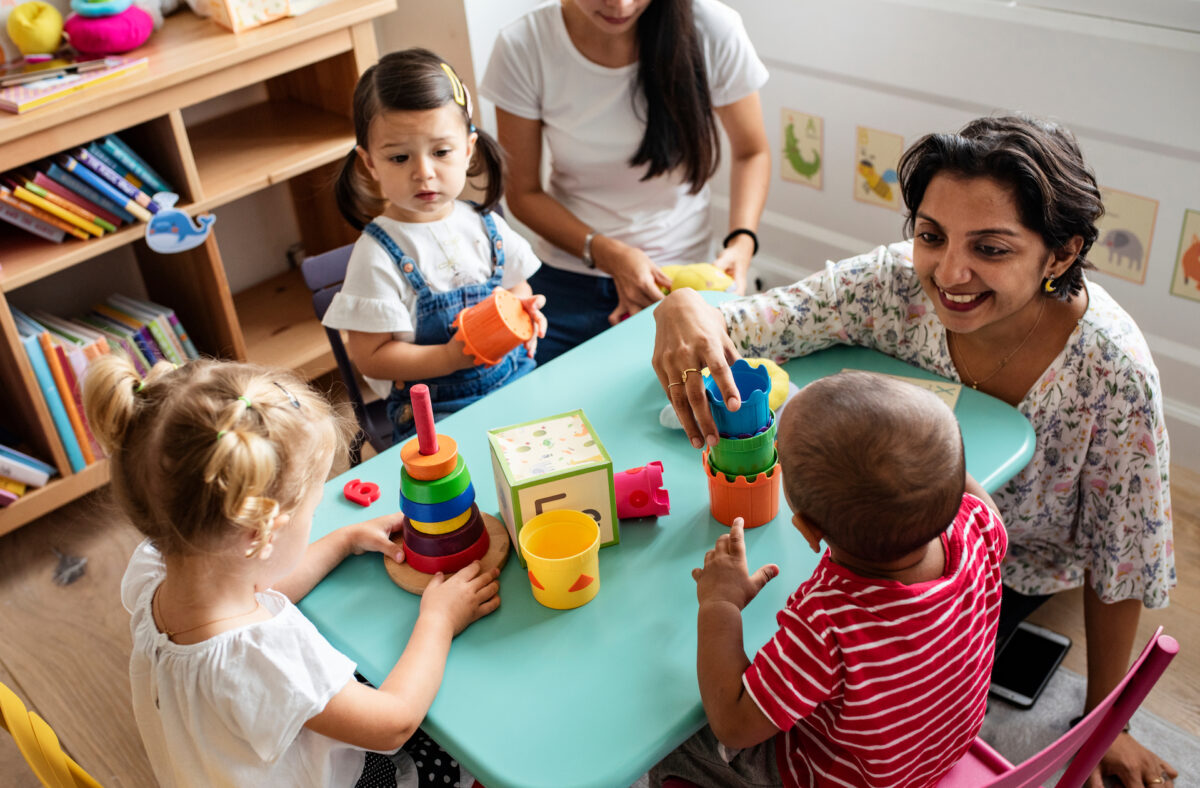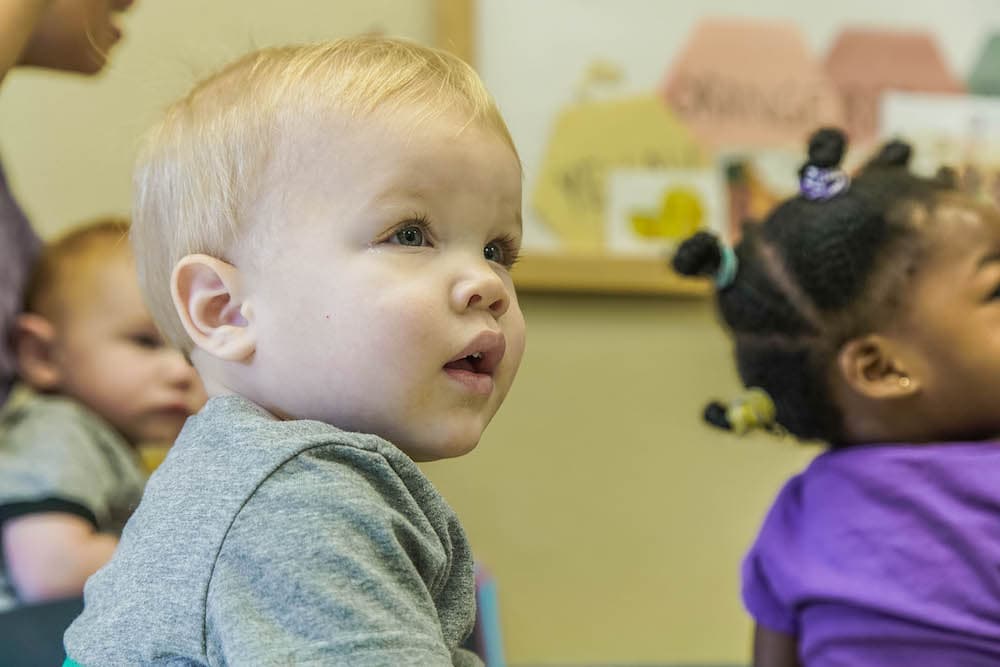Explore Highly Recommended Daycare Near Me for Infants: Top Carriers Near You
Explore Highly Recommended Daycare Near Me for Infants: Top Carriers Near You
Blog Article
The Function of Childcare in Promoting Your Toddler's Psychological and Cognitive Abilities With Structured Play and
The duty of day care in supporting a toddler's cognitive and emotional development is frequently ignored, yet it serves as an essential environment for organized play and educational tasks. Through meticulously developed interactions and experiences, caregivers promote vital abilities such as emotional understanding and problem-solving. These fundamental aspects not only improve a youngster's capability to get in touch with peers however also foster durability and versatility in numerous situations. Comprehending the subtleties of just how these dynamics unravel elevates important concerns concerning the lasting impact of early childcare experiences on individual development and social integration. What might that imply for future growth?
Value of Organized Play
Structured play is a crucial part of young child advancement, as it provides a structure whereby kids can participate in meaningful communications and finding out experiences. This kind of play is intentionally made to foster numerous developing skills, such as cognitive, social, and physical abilities. By joining organized tasks, toddlers find out to comply with policies, take turns, and accept peers, every one of which are vital for their interpersonal abilities.

In addition, structured play typically incorporates instructional aspects, such as counting, color acknowledgment, and language development, flawlessly incorporating discovering into enjoyable activities. This technique not only records young children' focus however likewise reinforces essential principles in a satisfying manner. On the whole, structured play is crucial in promoting a well balanced advancement, gearing up toddlers with the fundamental abilities essential for future discovering and social communications.
Emotional Advancement in Childcare
Childcare settings play a crucial role in fostering psychological growth in kids. These settings offer children with opportunities to interact with peers and caregivers, promoting the growth of necessary social-emotional abilities. With routine communications, kids discover to recognize and express their feelings, such as sadness, pleasure, or stress, which is vital for their emotional maturation.

Additionally, the structured atmosphere of daycare allows children to experience a range of emotions in a risk-free area. They find out to take care of sensations of separation anxiousness when transitioning from home to daycare and develop strength as they browse new partnerships and experiences. Generally, the emotional growth cultivated in childcare not only advantages young children during their developmental years however likewise prepares for healthy and balanced interpersonal relationships and emotional health throughout their lives.
Cognitive Skills With Tasks
Through taking part in a range of tasks, toddlers in daycare setups can significantly boost their cognitive abilities. Structured play and instructional jobs are essential in advertising cognitive growth, as they supply chances for expedition, problem-solving, and important thinking. Activities such as challenges, building blocks, and memory video games challenge young children to think artistically and rationally, promoting essential skills like spatial understanding and pattern acknowledgment.
Additionally, interactive storytime sessions encourage language development and comprehension. By listening to stories, toddlers discover to process details and involve their creativities, which boosts their narrative abilities and vocabulary. In addition, hands-on go to this web-site activities including crafts and arts boost fine motor skills while additionally urging self-expression and creative thinking.
Sensory play, such as sand or water tasks, enables young children Full Report to explore various appearances and materials, advertising inquiry-based knowing. These experiences not just boost cognitive capabilities however also instill a feeling of inquisitiveness regarding the globe around them - toddler daycare near me. Generally, the varied variety of cognitive activities given in childcare environments plays a crucial duty fit a young child's capacity to believe seriously, resolve problems, and involve meaningfully with their environments
Social Connections and Communication
In a nurturing atmosphere, toddlers naturally forge social links and participate in interactions that are vital for their social and psychological growth. Daycare settings offer a distinct chance for children to connect with peers, fostering essential social abilities such as sharing, collaboration, and problem resolution. These interactions assist young children learn to navigate their feelings and understand the perspectives of others, which are critical parts of psychological knowledge.
With structured play and group activities, toddlers are motivated to interact their feelings and ideas, boosting their spoken abilities and promoting compassion. Engaging with peers likewise presents them to diverse social standards and behaviors, enriching their understanding of social dynamics. Consistent communication with various other youngsters assists to construct a sense of area, providing a support system that is valuable for emotional development.
As kids join joint jobs, they find out the importance of patience, arrangement, and teamwork. These fundamental social abilities are critical as they plan for future connections, both in instructional settings and beyond. Ultimately, the social connections developed in day care play a significant duty fit a young child's ability to interact favorably and successfully with others throughout their lives.
Role of Caretakers in Growth

Caregivers play a crucial duty in cultivating kid growth, especially in the context of the social communications they experience in day care settings. These professionals provide a caring atmosphere where young children can explore their emotions and cognitive abilities via structured play and educational tasks. By taking part in purposeful discussions, caregivers support language growth and improve social skills.
Additionally, caregivers design suitable behaviors and psychological actions, aiding young children learn empathy and problem best site resolution. Their existence also develops a sense of safety and security, which is essential for youngsters to confidently discover their surroundings and involve with peers.
Along with social and emotional support, caretakers are critical in executing instructional curricula that promote cognitive development - baby daycare near me. They present age-appropriate activities that promote inquisitiveness, important thinking, and analytic skills. This organized approach makes sure that kids not only appreciate their play but additionally acquire fundamental knowledge necessary for future knowing
Inevitably, the quality of caretaker communications considerably influences a toddler's general growth. By fostering a engaging and supportive environment, caregivers help prepare for healthy and balanced psychological and cognitive growth, gearing up youngsters with essential skills for their long-lasting trip.
Conclusion
In conclusion, childcare functions as a crucial setting for cultivating psychological and cognitive advancement in kids. Via structured play and , youngsters experience significant growth in their capability to acknowledge and express emotions, develop crucial thinking skills, and kind crucial social links. The duty of caretakers contributes in promoting these experiences, ensuring that each youngster gain from a nurturing environment that promotes long-lasting psychological health and cognitive innovation.
The function of daycare in supporting a young child's cognitive and emotional growth is typically taken too lightly, yet it offers as a critical atmosphere for organized play and educational tasks. In general, structured play is important in advertising a balanced advancement, outfitting kids with the foundational skills essential for future understanding and social interactions.
Daycare environments play a vital role in promoting psychological development in toddlers. Generally, the emotional development fostered in day care not only benefits young children throughout their developmental years yet also lays the groundwork for healthy and balanced social connections and emotional well-being throughout their lives.
With structured play and team tasks, toddlers are urged to connect their ideas and feelings, enhancing their spoken skills and advertising compassion.
Report this page